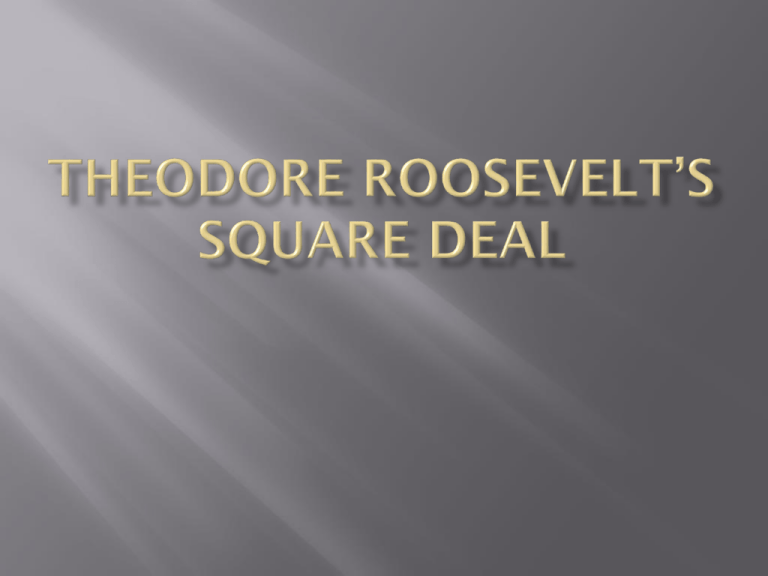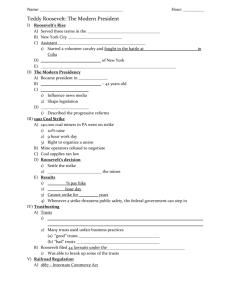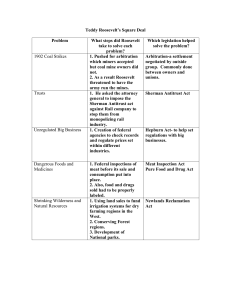File
advertisement

Theodore Roosevelt was never intended to become President by his own party They felt he was too hard to control He becomes president after McKinley is assassinated As President he did not hesitate to stand up for the common people and make sure they received a “Square Deal” Roosevelt had always been in favor of a more powerful Federal Government Where do you stand on this issue? Think-pair-share Throughout the late 1800’s and early 1900’s Trusts (legal bodies created to hold stock in companies) controlled almost all industries Ida Tarbell and other muckrakers began to draw more attention to their corrupt business practices Sherman Antitrust Act of 1890 was intended to stop this but had been very difficult to enforce President Roosevelt singled out trusts that he thought were harmful Roosevelt administration filled over 44 antitrust lawsuits, winning many and breaking up many trusts 1902 Roosevelt ordered the Justice Department to sue Northern Securities Company, this started his rep. as a “Trust Buster” 1904 Supreme Court dissolved the Company 140,000 coal miners in Pennsylvania went on strike (9 hour work day, union, pay raise 20%) After 5 months coal reserves run so law, the president has to step in. Roosevelt threatened to take over the mine, finally both sides agreed to bring in a commission to mediate the dispute Strike was settled workers received a 10% raise, 9 hour work day BUT couldn’t force all workers to join the Union and were not allowed to strike again for 3 years Roosevelt saw a problem with the railroad industry 1887 Commerce Act was passed to prohibited price fixing but was ineffective Roosevelt urged congress to the Elkins Act of 1903, Railroads could not give rebates (discounts) for using a paticular railroad Railroads also couldn’t jack up prices without notifying the public first The Hepburn Act of 1906 limited railroad passes (bribes) and gave the government power to set maximum railroad rates These acts greatly increased the governments power After reading Upton Sinclair’s The Jungle he set up a committee to investigate the meat packing industry, then urged congress to pass the Meat Inspection Act of 1906 Under the Roosevelt administration the Pure Food and Drug Act was passed as well Stop the sale of contaminated foods and medicines (many children’s medicines contained opium, cocaine, or alcohol) Also called for truth in labeling (venders would openly sell products that claimed to cure cancer or cure balding). Until Roosevelt the Federal Government had not taking any action to preserve the environment Issues going on included; Pioneer farmers destroying forests for farmland, cattle overgrazing the Great Plains, coal refuse from mines, lumber companies causing flooding and not planting new trees, cities dumping raw sewage and industrial wastes into rivers/lakes Roosevelt condemned the way the environment was being treated He set aside 148 million acres of forest reserves, 1.5 million acres of water-powers sites and another 80 millions acres to be explored for mineral and water resources Roosevelt also established more than 50 wildlife sanctuaries and several national parks National Reclamation Act of 1902, used money from the sale of land in the West to fund irrigation projects, such as Roosevelt Dam in AZ Roosevelt did appoint several African Americans to important federal positions However, many feel that he could have done more to help the African American civil rights movement




